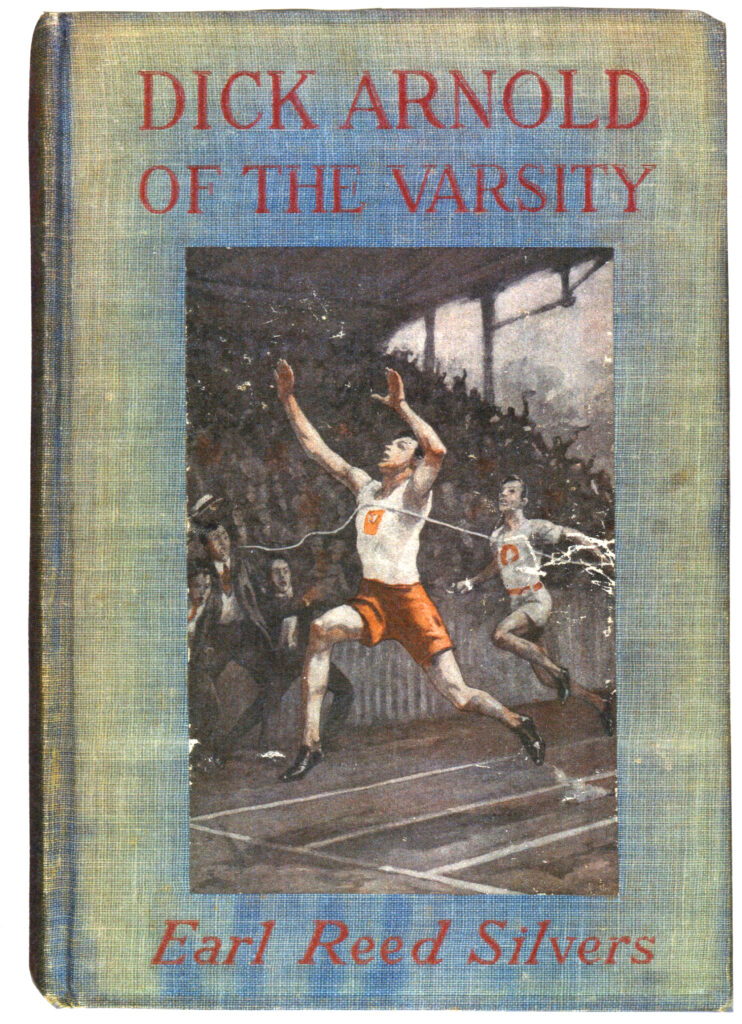
Earl Reed Silvers
Submitted by Al Shipley, City Historian and Rahway Library Research Consultant
Earl Reed Silvers (1891-1948), a Rahway resident for almost his entire life, became a widely-known author of short stories and novels and a popular and respected figure on the campus of Rutgers University in a career that spanned 37 years. His achievements in the fields of literature and academia were acknowledged when he became the first Rahwayan to be selected and included in “Who’s Who in America” (1926-1927), the well-known list of noted American personages. Although he was recognized well beyond the bounds of Rahway, he remained a familiar figure in the city by serving on important civic boards and taking an active part in community groups.
Silvers, whose ancestry had deep roots in Rahway, attended the city’s grammar schools and graduated from Rahway High School in 1909. After graduation he attended Rutgers University where he was editor of the university’s newspaper, The Targum, and the senior class yearbook, The Scarlet Letter. An all-around student/athlete, he was president of the Varsity Club and the vice-president of the Philoclean Society, a university literary group. He graduated in 1913 with high honors and was elected to membership in the Phi Beta Kappa Society.
Shortly after returning to Rahway, he became editor of the Rahway News Herald, a bi-weekly publication of local news. His tenure as editor was short lived, however, as he was called back to Rutgers to begin a career that would last almost four decades. He spent his first year in the position of Alumni Secretary and in 1916 was promoted to the office of Assistant to the President, a post he held until 1925. During World War I he directed the university’s War Service Bureau and subsequently wrote a history of the Rutgers men who served in the war. After nine years on the president’s staff, he was named Director of Public Information and eight years later became Director of Alumni Public Relations. It was in this position that he was awarded First Prize for the Best Editorial of the Year (1936) by the American Alumni Council for his entry “At Rutgers No Athletics are now being Over Emphasized.” The editorial was written in defense of collegiate athletes in view of reports alleging that universities were buying athletes to participate in their athletic programs. Silvers founded the RutgersAlumni Quarterly and edited its successor, theRutgers Alumni Monthly. In 1937 he was appointed the first director of Rutgers University Press. It should be noted that while he was fulfilling the responsibilities of these various important positions, he was educating the young men of the university as an Associate Professor of English. In 1944 he was named Dean of Men, a position he held until his death in 1948.
It was after Silvers started his work at Rutgers that he began to write. Penning his first story in 1916, he would go on to produce more than 1000 short stories, 27 adolescent-themed novels and several books for adult audiences. His Dick Arnold and Nick Beals serials were tales about the exploits of high school athletes and students. In these entertaining stories, the author always presented a sensitive and insightful analysis into the situations encountered by young adults. He was a prolific contributor to magazines, including Boy’s Life, Reader’s Digest, American Magazine, and Good Housekeeping, often writing under the penname David Stone. Silvers was published in so many magazines so frequently that he once wrote an article that became popular for would-be authors titled, “The Editor Accepts – How to Write Short Stories that Magazines Buy.” One of his short stories, “If in Years to Come” was dramatized by Orson Wells as a radio feature in 1941. The famous actor/director praised the story as, “One of the warmest and nicest love stories I have ever found for radio.” In 1942, he was awarded an honorary degree of Doctor of Letters by his Alma Mater.
With all of his responsibilities at Rutgers and the efforts he devoted to his writing, Silvers still gave time and attention to his home town, most often serving on committees that involved youth. He was a member of the Board of Education, serving several terms as its president, and was an influential member of the Juvenile Advisory Panel. In 1942 he was named secretary of the Recreation Planning Committee, a group formed to find a suitable recreation facility for use by the black community. He was a faithful member and elder of the First Presbyterian Church and was active in several social clubs including the Ilderan Outing Club.
Upon his passing, funeral services were held at Kirkpatrick Chapel on the Rutgers campus. It was reported to have been one of the largest funeral gatherings in the history of the school. The Rutgers President gave the eulogy remarking, “He possessed the gift of being able to look into the hearts and minds of young men to understand their perplexities and their aspirations, to guide them, to restore confidence and hope. He was not concerned with a man’s ancestry, or the color of his skin, only with the quality of his mind and the color of his heart. He had unbounded faith in students and they had unbounded faith in him.”






